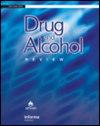Prioritising people who use drugs in health policy: An Australian Capital Territory case study
Abstract
Introduction
Governments are increasingly identifying priority populations on which to focus health policy and to measure health and wellbeing outcomes. Prioritising populations that are considered to be higher risk or to have particular needs that may not be captured within the parameters of health policy developed for the general population, is essential to health equity and efficient resource allocation. However, the criteria that governments use for prioritising populations is often vague or unspecified. To date, people who use drugs are almost never identified as a priority population in health policy, despite poor health and wellbeing outcomes.
Methods
We developed three-pronged criteria—disadvantage, prevalence/accessibility and amenability to change—for prioritising populations in government health policy. We used these criteria to compare people who access alcohol, tobacco and other drug (ATOD) services with populations which are prioritised within the Australian Capital Territory Government's Wellbeing Framework.
Results
Use of the criteria indicates that health policy prioritisation of people who access ATOD services is warranted. People who access ATOD services experienced worse health and wellbeing outcomes across all measures.
Discussion and Conclusions
Given increasingly explicit prioritisation of populations in health policy, there is an opportunity to advance health equity and embed policy efficiency through formal and transparent consideration of which populations to prioritise. Using set criteria for prioritising populations in health policy is possible, and could help identify populations often overlooked for prioritisation, such as people who access ATOD services.

 求助内容:
求助内容: 应助结果提醒方式:
应助结果提醒方式:


